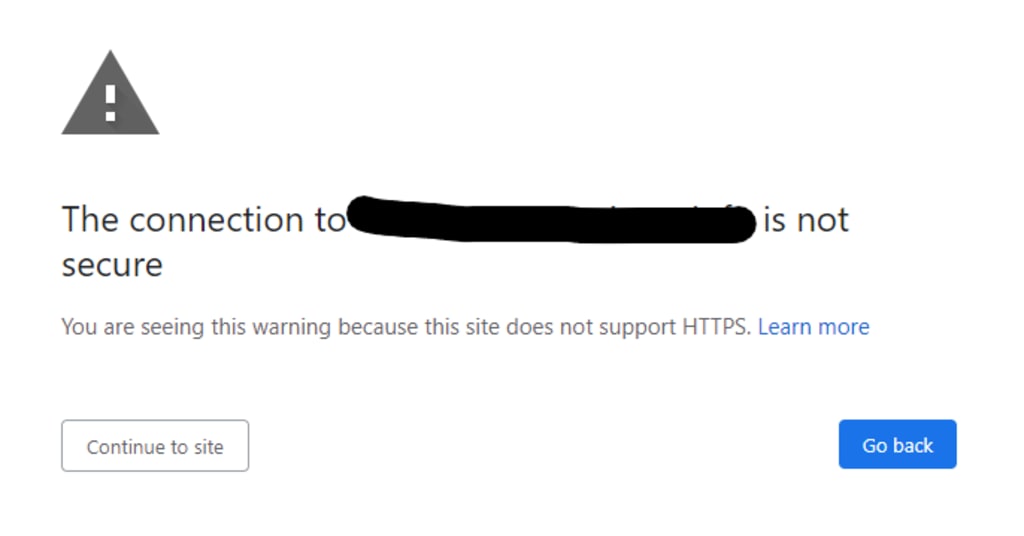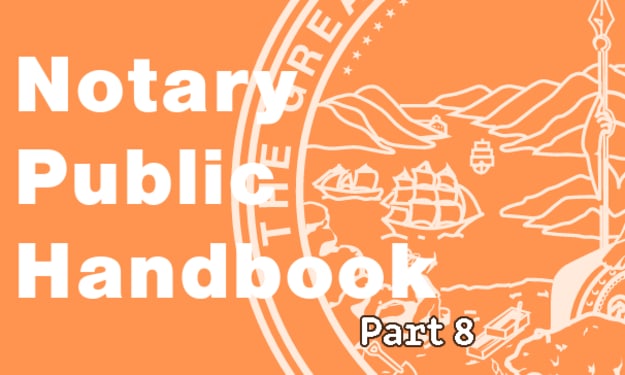Researching Government Approved Notary Public Education Vendors
Personal evaluation and experience of the Approved Vendors List

Since 2013, I had been looking (on and off) into the idea of becoming a notary public. My education had been in Library Science, and specifically Archives. I got to work as an intern not only at the Wisconsin State Historical Society, but also at the National Archives and Records Administration in Boston. There were a lot of really neat records I handled, re-housed, entered into database systems, and researched for public requests. I have experience with government records. One thing for certain is that there are strict rules regarding personal privacy when something is publicly available.
What does this have to do with a website that gives you the message, “Site not Secured?” Most times, depending on the content of the site, I will click, “I accept the risk.” and move along with my day. However, in my search for a suitable organization to receive my notary public training, I have been ABSOLUTELY FLOORED at how many of these State recommended training websites do not have HTTPS enabled on their website. If it seems like I’m making a big deal out of it…well, you bet I am! While these sites might be “just” for training and education of notaries, there are two major considerations that immediately come to mind. First, I’m thinking of my own data that I would be entering; personal address, credit card information, as well as the basic fact that I am interested in becoming a notary. Sites that do not have SSL encryption are much easier targets for hacking attempts. The previously mentioned personal data could be very valuable to those looking for viable targets for identity theft. Secondly, it erodes the trust I have in the institution that is advertising themselves via that site. Notaries public deal with a lot of very sensitive personal data. I do make the correlation that if a purported educational site cannot practice what they preach, I am skeptical of their abilities to teach about data security.
It is true that much notary work is still done in person, on paper. However, with the improvements to digital technology as well as a worldwide health crisis, some states have allowed for virtual face to face notarizations. These types of interactions DO end up storing clients Personal Identifying Information (PII) on personal computers as well as encrypted databases. It is very nerve-wracking and mostly disheartening to go through the list of the 172 Secretary of State approved course vendors for my county. While there is a disclaimer on the Approved Vendors [dot] gov site saying, “Approval of a course of study is not an endorsement or recommendation,” I would hope that there would be some oversight on the not just security, but even validity of the contact information.
For my foray into becoming a notary public, I have the following requirements/preferences for the training. I compiled a spreadsheet of the approved vendors that serve my county and I narrowed them down by the following criteria, in order:
1. They provide a 6 hour course.
Notary renewal courses are only 3 hours long, but a new commission requires 6 hours. This is a non-negotiable feature as it is codified that the training is six hours.
2. They have a website.
Surprisingly, some of these training providers did not have a website, but only a phone number. Currently, I am gathering information at 11pm on a Tuesday night to bring back to a few of my friends so we can compare locations, dates and cost. No website means I have no way of obtaining the data when I need to. 13 of the options did not have a site.
3. They had been on the Vendor List effective 2018 or prior.
I would like to know that the company or entity that I will be paying has experience and especially experience prior to the pandemic. This is a somewhat negotiable point, but longevity and experience does hold merit in a field such as this. You don’t gather the types of interactions with scammers and how to deter that in just a few months.
4. They offer in person, live classes.
I would like to learn from the questions and experiences of others. I have read the 2023 California Notary Handbook already. A lot of catching issues or potential scammers has a lot to do with the power of observation and small talk skills that will help you gather the information you need to determine if signatories are willing and knowingly signing certain documents. I want to be in the room with the people who have had that experience. There is also the added benefit of starting to network with local notaries-to-be. Having a support system in the same field to refer others to or to possibly receive referrals from can be invaluable.
While this is seemingly a negotiable factor, I am not willing to bend on it. The determination of if it was online only or not could have been based just on the URL name, such as “onlineNotaryCourse [dot] com” or “notaryCourseOnline [dot] com” (Yes, both exist), it would get the tag “Appears to be online only” and I’d move on.
5. The site is active, appears reliable, is actually a notary educational site, and is secure.
As the previous criteria dropped options off the list, I didn’t even consider this to be an issue until I started running into it. One of the options for a “site” was just a person’s email. Another had a [dot] weebly [dot] com extension. If you are going to be taking hundreds of my dollars for a service, I would hope there is a level of professionalism that would also allow you to brand your website properly. A few sites were parked, re-directs or just plain unavailable.
Out of 172 options, and after eliminating options 1-4, there were still 15 sites that did not have active SSL certificates. I’m sure if I were to check some of those links for 3 hour courses or some of the ones that appear to be online only that I would find more.
Yes, I did complete the review of all 172 approved options. There were some duplicates. If the same educator offered Live and Online and 3 and 6 hour courses, it is possible they were listed 4 times. With all of the above crossed off the list, I managed to end up with 4 websites that seemed viable. Just 4. Other websites had issues such as “item no longer available” when I went to add to the cart if pricing wasn’t clear. Some didn’t have upcoming dates with the last class being over 2 months ago. Those also did not make the cut.
Out of 172 options, there are only FOUR that had what I needed, provided a location for me to find their information, had the experience, offered what I preferred, and appeared to be a trustworthy and functioning digital entity. This is not a call to “do better,” not is it some galvanizing experience in which I feel I should go in and “change the system!” This is honestly something that could be rectified with an intern doing a month or so of research, updating, and following up with these providers. No change to the system is needed here. Just a little care and maintenance.
About the Creator
Rachel Pieper Decker
Displaced Minnesotan in Southern California.
Gamer, streamer, fiber arts enthusiast, Web3 dabbler, aspiring Notary Public
Connect with me: twitter.com/HyperZenGirl * twitch.tv/HyperZenGirl
Affiliate links: https://linktr.ee/HyperZen






Comments
There are no comments for this story
Be the first to respond and start the conversation.